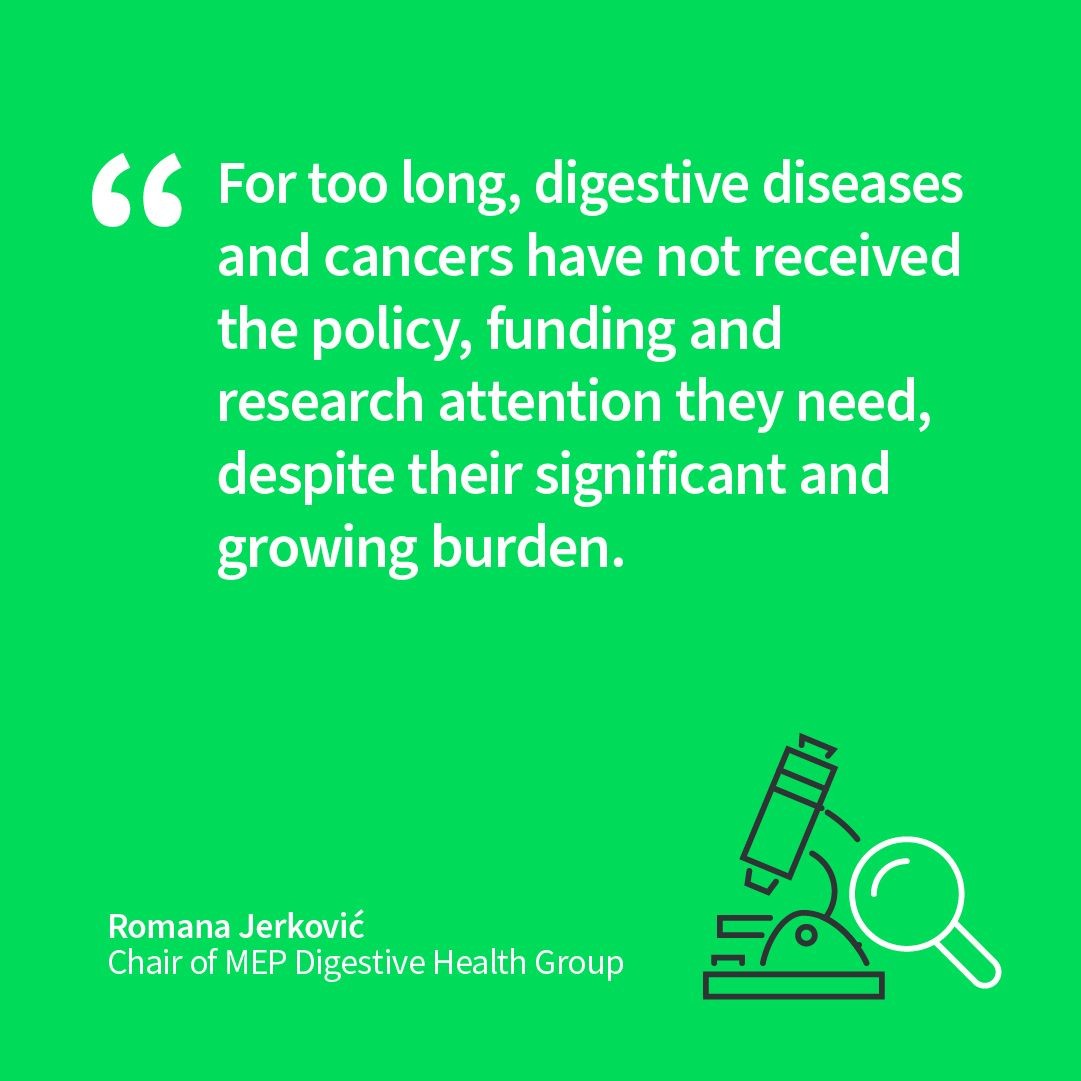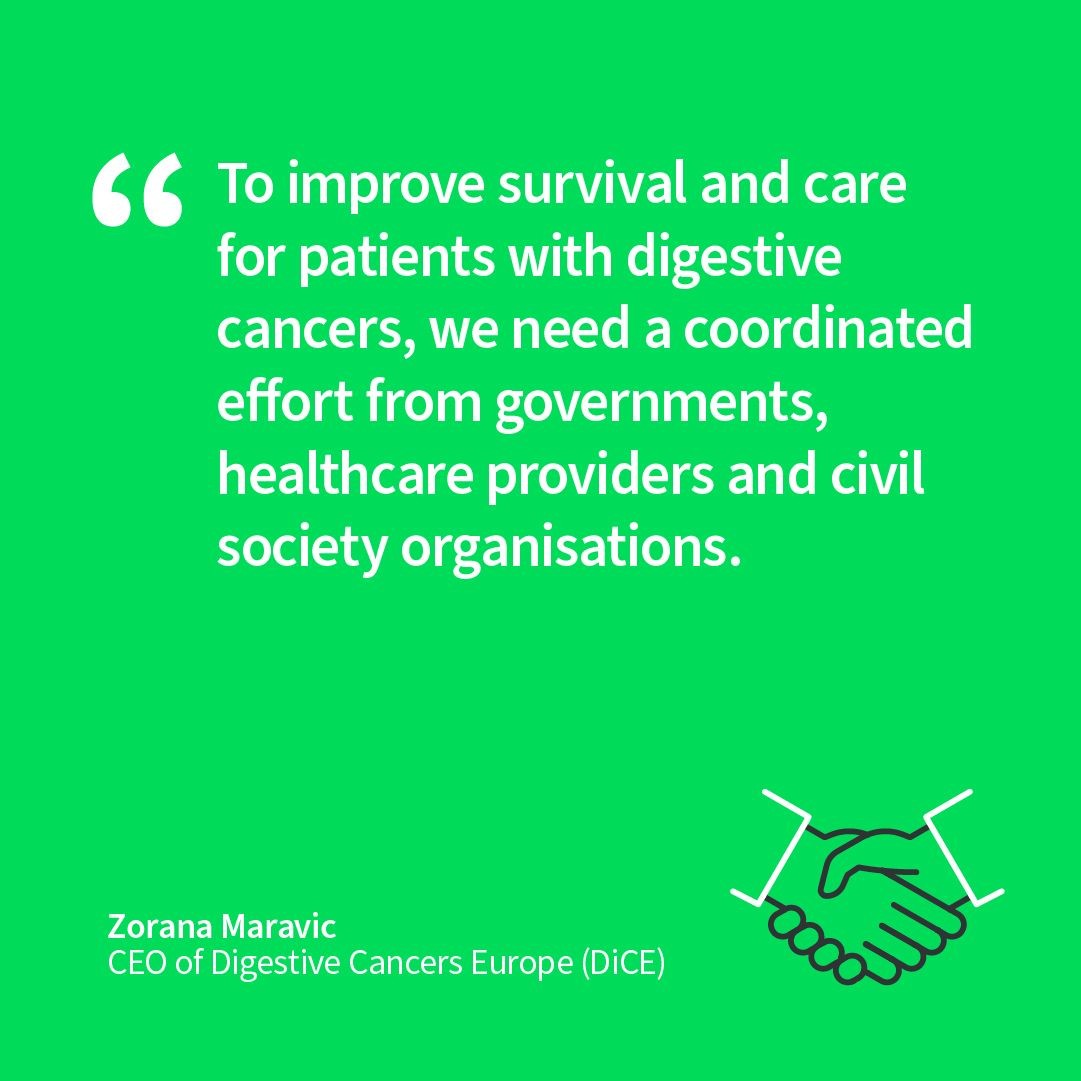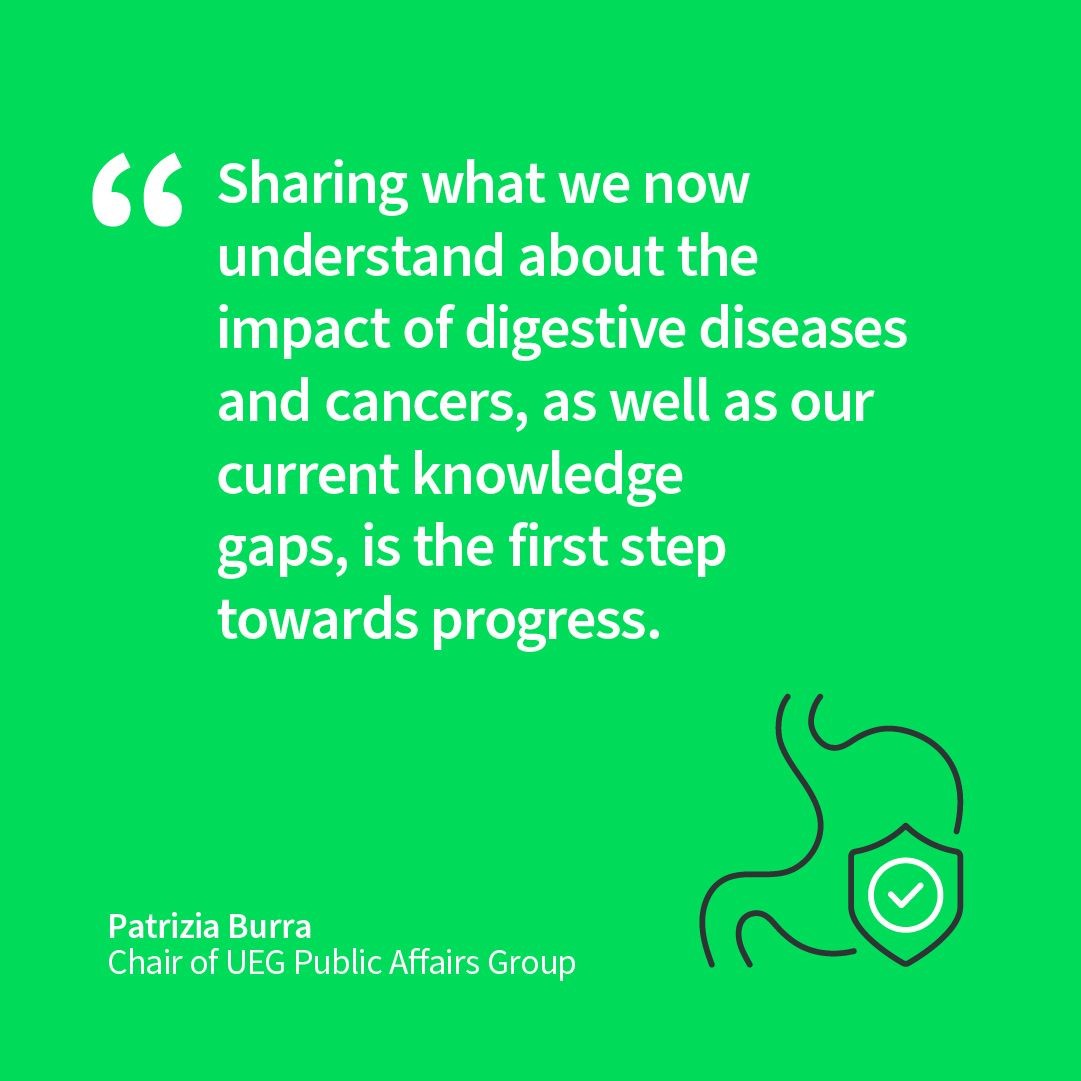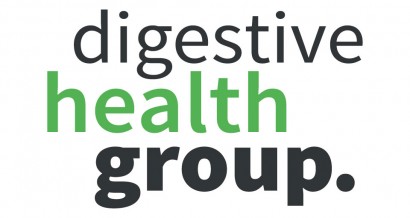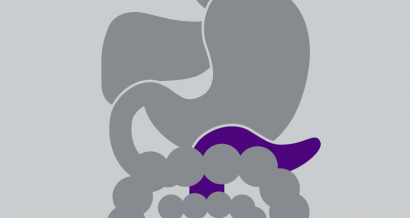In promoting digestive health, we work towards the prevention of digestive diseases, as well as the advancement and equal access to treatments to help improve patient outcomes. We focus on reducing the socio-economic burden of digestive diseases and call for increased research funding.

Key messages
On April 26, 2023, we organized an event at the European Parliament that brought together digestive health experts and key stakeholders from the European health community for a lively and solution-oriented discussion on the current state of digestive health across Europe.
For the launch of our latest publication, we were pleased to be joined by representatives from the European Parliament, the European Commission, WHO Europe and the Patient organisation Digestive Cancers Europe (DiCE).
Find a summary of the event in this article published on Euractive.
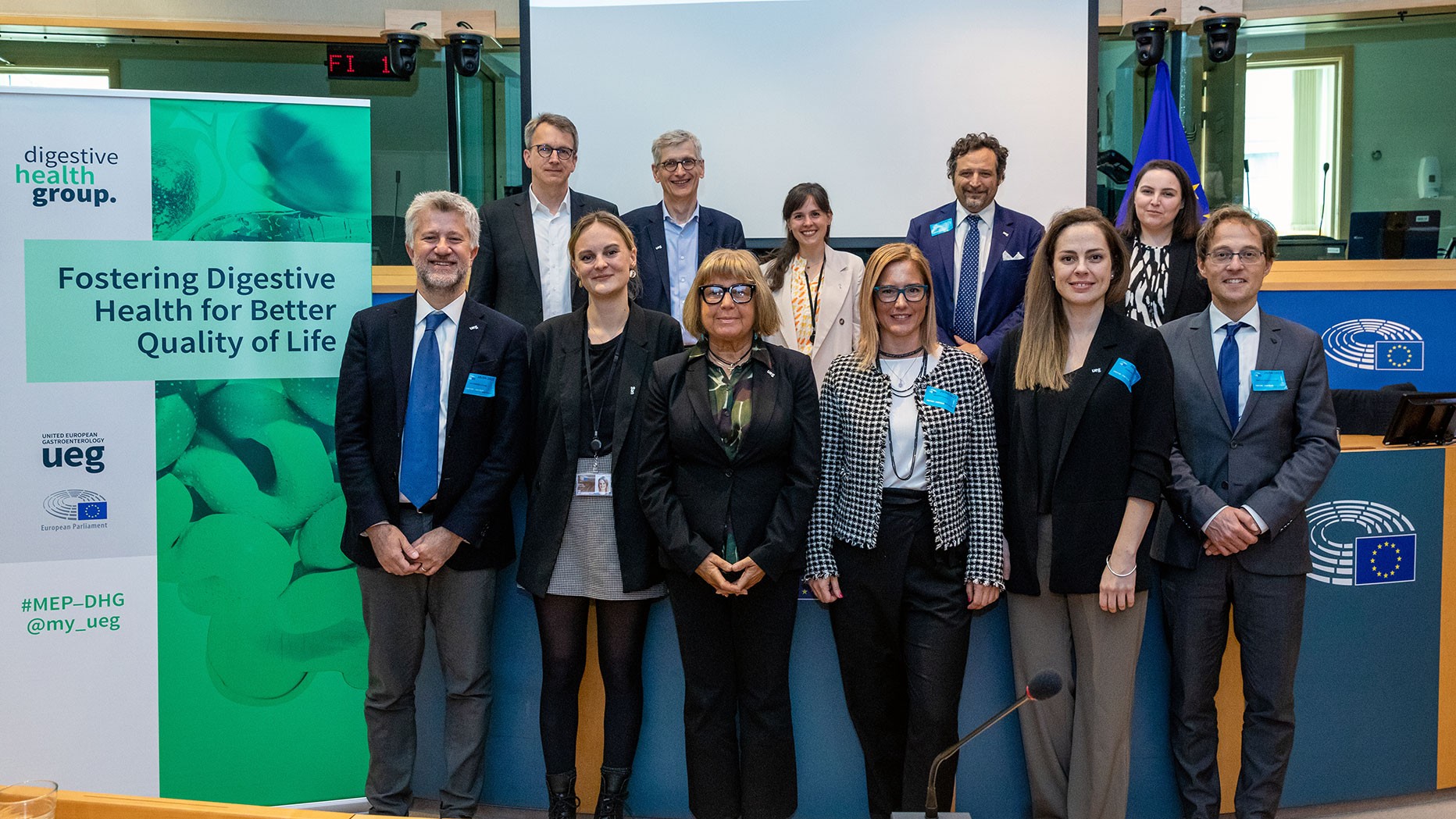
Data from the pan-European study, commissioned by UEG on the burden of digestive diseases and associated research gaps, highlights worrying increases in the prevalence of several digestive diseases since 2000. This new UEG study will assist in accelerating progress in reducing the burden of digestive disorders and help to identify priority areas for research and investment across Europe.
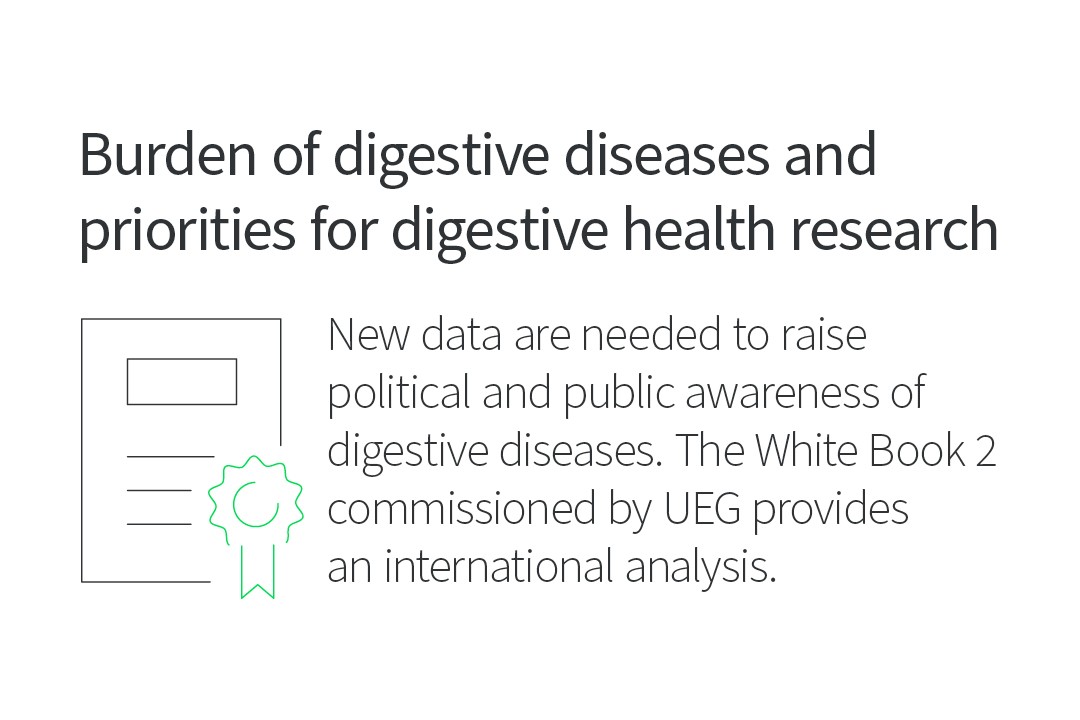
Our core positions
At the core of our advocacy work are four core focus areas: nutrition; alcohol-related harm; chronic digestive diseases and digestive cancers. For each area, we closely monitor policy developments and issue calls to EU policymakers in order to drive change.

Dietary choices can increase the risk of developing chronic digestive diseases. The increasing consumption of ultra-processed foods, including those high in sugar, salt, saturated fats and trans-fats, is a huge concern and places an excessive strain on European health systems.
Way forward:
- Greater understanding of digestive diseases and promotion of a change in eating culture
- Whole-of-society approach to transform food systems: establishing clear, scientific targets and limiting the consumption and production of unhealthy foods
- Comprehensive range of policies to limit the availability, affordability and acceptability of fast foods (fiscal measures, marketing, labelling)
- Legislation to ban industrial trans-fats
- Subsidies to increase the intake of fruits and vegetables
Understanding the human microbiome - webinar series co-hosted by MEP Sarah Wiener
These webinars are addressed to policy makers and the greater public and delve into current topics, such as nutrition, gut health and diseases prevention, with the aim of making the case for improved food policy in the EU.
Farm-Fork-Microbiome connection: Steps towards a healthier future
This event was the final webinar in the series, aimed at summarising the existing evidence on the impact of diet and lifestyle on gut microbiota and human health and exploring the potential of EU policy in delivering improved gut health.
Speakers:
- Prof. Shira Zelber-Sagi, School of Public Health, University of Haifa, Israel
- Prof. Benoit Chassaing, Chassaing Laboratory, INSERM, France
- Floriana Cimmarusti, Secretary General, Safe Food Advocacy for Europe(SAFE) and Consumers Representative on the European Food Safety Authority’s Management Board
- Dirk Hadrich, Policy and Programme Officer, European Commission, Directorate-General Research & Innovation, People Directorate, Combatting diseases Unit
- Prof. Michael Manns, Co-Chair of the EASL- Lancet Liver Commission and President of Hannover Medical School, Germany
Cancer and the gut microbiome
Top experts provided the latest insights into:
- The gut microbiome’s potential in preventing tumour development
- The role of the gut microbiome in the initiation and progression of malignant digestive diseases
- The role of the gut microbiome in the treatment of cancer
Speakers:
- Prof. Thomas Seufferlein, Head of Department of Internal Medicine I, University Hospital of Ulm, Germany
- Prof. Herbert Tilg, Head of Department of Gastroenterology, Hepatology & Endocrinology, Medical University of Innsbruck, Austria
The impact of ultra-processed foods
The expert speakers explained how ultra-processed food impacts our gut health, with a focus on:
- The burden of ill-health due to unhealthy diets
- The impact of common components of ultra-processed foods on gut microbiome
- The role of food reformulation and nutrition labelling
Speakers:
- Prof. Shira Zelber Sagi, Head of School of Public Health-University of Haifa, Israel
- Prof. Benoit Chassaing, Principal Investigator, Chassaing Lab at Inserm, France
The link to obesity and liver disease
This webinar explored the links between gut microbiome, nutrition, obesity and liver diseases, with a focus on:
- Insights into the role of microbiome in obesity and liver disease
- Use of microbiome data for improved nutrition and health
- The role of food policy in obesity prevention
Speakers:
- Eran Segal, Principal Investigator at SegalLab, Weizmann Institute, Israel
- Floriana Cimmarusti, Secretary General, Safe Food Advocacy Europe (SAFE)
Digestive cancers, which include colorectal, pancreatic, gastric, oesophageal and liver cancer, are responsible for over one-third of cancer-related deaths across UEG member countries. In 2020, of the top 10 cancers with the newest cases in Europe, three were digestive cancers.
Way forward:
- Support initiatives on digestive cancers, within the remit of the new EU Cancer Plan and include a lifestyle approach on prevention.
- Prioritise the implementation of standardized population-based and quality-controlled screening programmes in member states and ensure that guidelines are updated.
- Increase funding for pancreatic cancer research (basic science and clinical studies)
Chronic digestive diseases inflict a heavy healthcare and socio-economic burden in Europe. These diseases often affect patients at a younger age and lifelong disorders can have a significant impact on society. IBD, for example, affects 3 million people across Europe and costs the EU up to €5.6 billion per year.
Way forward:
- Support a greater emphasis on health in the 2019-24 mandate.
- Recognise the socio-economic burden of chronic digestive diseases.
- Increase funding for the prevention and management of chronic digestive diseases and their impact on health systems.
- Build a comprehensive EU strategy on chronic diseases.
The European region has the highest level of alcohol consumption in the world, with 25% of deaths from digestive diseases directly attributed to alcohol.
Way forward:
- Prioritise protection from excessive alcohol consumption, including the prevention of aggressive marketing and deliver on a regulatory approach to labelling.
- New EU Alcohol Strategy to support EU countries in reducing alcohol-related harm.
Position papers
2024
Joint Position Paper on Pancreatic Cancer
This position paper, produced by Pancreatic Cancer Europe (PCE) in collaboration with Cancer Patients Europe (CPE), Digestive Cancer Europe (DiCE), European Pancreatic Club (EPC) and UEG, highlights the alarming trends related to pancreatic cancer in Europe. It outlines actionable solutions to combat pancreatic cancer, which remains the third leading cause of cancer deaths in Europe.
In view of the 2024 EU elections, we have put forward concrete policy recommendations for the six key areas identified in the White Book 2. These recommendations serve as the main drivers for improved digestive health outcomes in Europe.
UEG Policy Recommendations: Children’s health
UEG Policy Recommendations: Health inequalities
UEG Policy Recommendations: Research funding & data collection
UEG Policy Recommendations: Primary prevention
UEG Policy Recommendations: Cancer screening
2023
UEG Open Letter to EU leadership
Based on the key findings of the White Book 2 study, we address the EU leadership with six policy recommendations to create a stronger health policy environment for digestive health in the EU.
2022
Pancreatic & Gastric Cancers – Joint DiCE, PCE and UEG Policy Solutions
Together with Digestive Cancers Europe and Pancreatic Cancer Europe, we have issued joint policy solutions for lifting the neglected burden associated with gastric and pancreatic cancer.
UEG Position Paper on Obesity and Digestive Health
The obesity epidemic is one of the most significant public health challenges that Europe now faces. This position paper highlights the role of overweight and obesity in digestive diseases and puts forward our recommendations for policy interventions.
Joint UEG-DiCE Letter – EU Cancer Screening Recommendations
We raise our serious concerns regarding the developments that we understand are taking place in respect to approving the new EU Council Recommendations on Cancer Screening.
Digestive Cancer Screening Across Europe
This position paper presents the available evidence and main issues that need to be addressed to ensure the successful implementation of screening for four main types of cancer. It aims to provide recommendations to aid informed decision-making on reducing the burden of digestive cancers across Europe.
2021
Bringing pancreatic cancer treatment to the 21st century
With this position paper we call for policy makers to urgently address several research gaps: identification of the correct tools to achieve earlier diagnosis, development of new strategies to overcome therapy resistance, and the improvement of the quality of life and patients.
COVID-19 and Digestive Health: Implications for prevention, care and the use of COVID-19 vaccines in vulnerable patients
This position paper serves to inform policy makers, patients, healthcare professionals and the general public of the latest evidence on the impacts of the SARS-CoV-2 pandemic on digestive health. In the same vein, it aims to improve understanding of the clinical considerations on the use of COVID-19 vaccines in patients with chronic digestive conditions and to present UEG’s latest recommendations to support evidence-informed decision making.
AI in Gastroenterology: A window of opportunity
To maximise the life-changing opportunities offered by AI and robotics, we must overcome a variety of challenges. In this position paper, UEG highlights the value AI can provide to the field of gastroenterology, identifies the challenges we face and sets out a 4-step pathway forward.
2020
UEG Position Paper on AI
Owing to their rapid development, artificial intelligence (AI) technologies offer great promise for gastroenterology practice and research. This position paper conveys the calls of the GI community in relation to the upcoming EU legislation on AI.
Pancreatic Cancer: a medical emergency
There is an urgent need to address the insufficient research funding into pancreatic cancer research. In this position paper we call for greater focus on the key developments needed to tackle the current challenges of pancreatic cancer and improve the outcomes.
UEG’s response to the interim report of the Mission Board for Cancer
Following the publication of ‘Conquering cancer: Mission possible’ interim report, we responded with a statement aimed at emphasizing how certain proposed measures, if taken, could aid the prevention, diagnosis and management of digestive cancers.
Position paper addressing unhealthy dietary patterns through mandatory front-of-pack labelling
To promote optimal digestive health and to reduce the burden inflicted by obesity and chronic digestive diseases, we call in this position paper for the adoption of mandatory front-of-pack labelling (FOPL) across the EU.
Position paper concerning COVID-19 and digestive health
This position paper features our recommendations and calls to governments, EU institutions and interest groups across Europe concerning the COVID-19 pandemic.
Coordinating European Action Against Colorectal Cancer – CRC Manifesto
In this manifesto, we call for the implementation of organised, population-based screening programmes across the entirety of the EU and for Member States to improve the coverage and quality of existing programmes and reduce the burden of colorectal cancer.
Digestive cancers: Why actions are needed?
This position paper gives an overview of the burden of digestive cancers within Europe and outlines activities to improve the current state of art.
UEG Statement on EU’s Cancer Plan
As an organization representing the field of digestive health, we welcome the importance given to developing a Cancer Plan at EU-level and take this opportunity to draw attention to the growing threat posed by digestive cancers amongst the European population.
UEG Statement on EU’s Farm to Fork Strategy
We aim at reducing health inequalities across Europe and stand ready to assist the EU institutions with medical and scientific expertise across all the key aspects addressed by EU’s Farm to Fork (F2F) strategy.
2019
UEG and WONCA joint statement on reducing the burden of chronic digestive diseases
This UEG and WONCA joint statement sheds light on the burden of chronic digestive diseases in Europe. It highlights the role of primary care physicians in reducing this burden and recommends key actions that can be taken in primary care settings.
Key priorities for Horizon Europe Strategic Plan on Cluster 1 and its health-related challenges
The UEG Research Committee contributed to the consultation on Horizon Europe Strategic Plan, underlining UEG key priorities on Cluster 1 of the new EU research programme and its health-related challenges.
Joint press statement: Spirits industry afraid of their own ingredients?
In response to the spirits’ industry approach to labelling their products, UEG together with Eurocare, EPHA, EASL, CPME, AIM and NordAN released a joint press statement pointing out the shortcomings of the self-regulatory approach on alcohol labelling.
